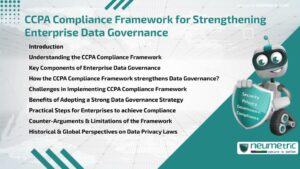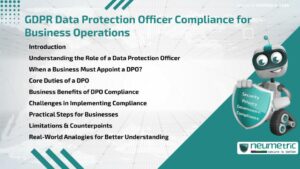Table of Contents
ToggleIntroduction
The concept of GDPR Data Protection Officer Compliance refers to how businesses meet the requirements of the General Data Protection Regulation [GDPR] by appointing & supporting a Data Protection Officer [DPO]. A DPO ensures that businesses process Personal Data Lawfully, Transparently & Securely. Compliance with this requirement is not only a legal obligation for many Organisations but also a way to build Trust with Customers & Partners. This article explores the DPO role, when it is mandatory, the challenges businesses face & practical steps for Compliance.
Understanding the Role of a Data Protection Officer
A DPO is an independent expert who oversees Data Protection strategies within a business. They act as the bridge between the Company, Regulatory authorities & Data Subjects. Their independence is vital-they must not be influenced by business interests when advising on Compliance.
In practice, the DPO serves as both a guardian & an advisor, making sure that Policies, systems & staff behavior align with GDPR standards.
When a Business Must Appoint a DPO?
Not all businesses are required to appoint a DPO. GDPR outlines specific conditions where appointment is mandatory:
- If the business is a public authority or body (excluding courts acting in their judicial role).
- If the business carries out large-scale systematic monitoring of individuals (such as online behavior tracking).
- If the business processes large-scale categories of Sensitive Data (such as health or biometric data).
Small Businesses may not always need a DPO, but voluntary appointment can still strengthen Compliance.
Core Duties of a DPO
The DPO has several core responsibilities:
- Advising the business on GDPR requirements.
- Monitoring internal Compliance with Data Protection Policies.
- Training staff & raising awareness of obligations.
- Conducting Data Protection Impact Assessments.
- Acting as a contact point with supervisory authorities.
By fulfilling these duties, the DPO helps businesses maintain GDPR Data Protection Officer Compliance across all operations.
Business Benefits of DPO Compliance
Compliance is not just about avoiding fines-it also creates business advantages:
- Trust building: Customers are more willing to share data when they see strong protection measures.
- Efficiency: Central oversight reduces Risks of duplication & mistakes in Data Handling.
- Preparedness: A DPO ensures businesses can respond quickly to Breaches or Access requests.
- Reputation: Demonstrating Compliance improves brand credibility in competitive markets.
Challenges in Implementing Compliance
While Compliance offers benefits, it also comes with challenges:
- Finding qualified DPOs can be difficult, especially for smaller firms.
- Balancing the independence of a DPO with their integration in daily operations.
- Cost implications of hiring or outsourcing a DPO.
- Misunderstandings about when a DPO is mandatory.
These challenges require careful planning & management support.
Practical Steps for Businesses
To achieve GDPR Data Protection Officer Compliance, businesses can take these steps:
- Assess whether a DPO is mandatory under GDPR criteria.
- Clearly define the DPO’s role in organisational structures.
- Provide resources & training to support the DPO’s independence.
- Establish reporting lines directly to Senior Management.
- Document all Compliance measures to demonstrate Accountability.
Limitations & Counterpoints
While the DPO role strengthens Compliance, it has limitations. For example, businesses may rely too heavily on the DPO without taking shared responsibility. Also, the cost of Compliance can be burdensome for smaller Organisations. However, these challenges do not outweigh the importance of having strong Data Protection Governance.
Real-World Analogies for Better Understanding
Think of a DPO as the “safety Officer” of a factory. Just as a safety Officer ensures workers follow health & safety laws, a DPO ensures staff follow Data Protection rules. Both roles prevent Risks, improve Culture & protect the Organisation from Penalties.
Takeaways
- A DPO ensures lawful & transparent Personal Data processing.
- Appointment is mandatory in specific cases, but beneficial for many businesses.
- Duties include advising, monitoring, training & acting as a contact point.
- Compliance provides trust, efficiency & reputation advantages.
- Challenges exist, but careful planning helps overcome them.
FAQ
What is a Data Protection Officer under GDPR?
A DPO is an independent expert responsible for overseeing Data Protection Compliance within an Organisation.
When must a business appoint a DPO?
Appointment is mandatory for public bodies, large-scale monitoring or processing of Sensitive Data categories.
Can Small Businesses voluntarily appoint a DPO?
Yes, Small Businesses may appoint a DPO voluntarily to strengthen Compliance, even if not required.
What are the main duties of a DPO?
They include Advising, monitoring Compliance, Training, assessing Risks & liaising with Supervisory authorities.
Can a business outsource the DPO role?
Yes, businesses can outsource the DPO role to external professionals as long as independence & expertise are ensured.
What Risks arise if a business does not appoint a DPO when required?
Failure to appoint when required can lead to significant fines & reputational damage.
How does a DPO benefit Business Operations?
They build Trust, increase Efficiency, prepare for Breaches & strengthen Brand Reputation.
Need help for Security, Privacy, Governance & VAPT?
Neumetric provides organisations the necessary help to achieve their Cybersecurity, Compliance, Governance, Privacy, Certifications & Pentesting needs.
Organisations & Businesses, specifically those which provide SaaS & AI Solutions in the Fintech, BFSI & other regulated sectors, usually need a Cybersecurity Partner for meeting & maintaining the ongoing Security & Privacy needs & requirements of their Enterprise Clients & Privacy conscious Customers.
SOC 2, ISO 27001, ISO 42001, NIST, HIPAA, HECVAT, EU GDPR are some of the Frameworks that are served by Fusion – a SaaS, multimodular, multitenant, centralised, automated, Cybersecurity & Compliance Management system.
Neumetric also provides Expert Services for technical security which covers VAPT for Web Applications, APIs, iOS & Android Mobile Apps, Security Testing for AWS & other Cloud Environments & Cloud Infrastructure & other similar scopes.
Reach out to us by Email or filling out the Contact Form…





